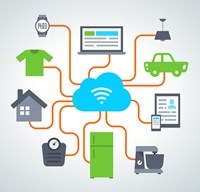
Subscribe & Follow
Advertise your job vacancies
Adapting retail in a digital environment
Technological advancements change the way people buy goods and even the way they think about money. A recent survey, conducted to examine the effect of the Internet of Things (IoT), revealed that 83% of respondents agree that billions of connected and wearable devices talking seamlessly to each other and to service providers, will likely "have widespread and beneficial effects" by 2025.

© Mimi Potter - Fotolia.com
At its core, the IoT concept takes devices, not previously connected online, and integrates them into the digital world. When IoT meets the consumer space, retailers will need to rethink the traditional retail store, because consumers, who are accustomed to their connected devices at home, cars and in the workplace, will grow to expect similar experiences while shopping.
From guiding a consumer journey in the store to the right aisles based on their shopping list via an app to scanning QR codes that offer discounts, retail will benefit from these advancements in technological service concepts. A recent KPMG study, undertaken by technology business leaders globally, found that retail and intelligent shopping has the greatest potential to generate revenue, as a result of adoption of the IoT.
What does this mean for retailers?
Retail in South Africa is experiencing a shift due to the ever-changing expectations of more digitally-empowered consumers. The mobile phone specifically is changing the retail experience in South Africa. Brands are starting to enter into uncharted territory, investing in mobile and dealing with challenges around the marketing effort required to achieve mass consumer adoption.
There are significant trends that consumers will want to experience when shopping, which will impact traditional retailers in coming years - especially if they don't see the value in investing in such technologies.
Purchasing goods has changed
In South Africa, 92% of internet users own a smartphone. This uptake of internet, which is primarily driven by social media and mobile technology, has blurred the traditional path retailers and marketers use to target consumers. Today's customers have become accustomed to doing their own research to get the greatest value out of every Rand spent.
The opportunity that exists for retailers in this constantly connected world is that devices can be used by retailers to get to know customers. For example, for consumers who are time pressed when shopping, technologies such as self-checkout can become a great value add, or pre-ordering and picking up at a special counter at store.
In other instances, mobile can help retailers learn what matters to a consumer in a particular location and at a particular time, which can help to deliver relevant and contextual offers, essentially recreating the outdated 'shopkeeper' conversations at scale. Delivering the right message, at the right moment, is the next stage in customer service and can rapidly turn intent into action.
Mobile loyalty opportunities make sense
Mobile provides new opportunities for customer loyalty, due to its reach and effectiveness throughout the entire purchase cycle and post purchase. A mobile device is always with the consumer and it makes sense that instead of a plastic card, the identification of a customer would be done via a mobile app. Plastic cards are outdated and retailers must make way for apps and rewards programmes, which can be integrated into social media and make use of the location awareness, inherent in smartphones.
It could be supermarkets who offer loyalty-linked product pricing, based on spending habits and purchases, or restaurant chains encouraging members to come in and get a free add on to their favourite meal, or post comments about the restaurant and their dining experience on social media to gain rewards.
Digital currencies
Mobile payment apps such as FlickPay, SnapScan and Geo-payments are gaining popularity, and the question remains, is the time of cash and cards coming to an end?
Africa is one step ahead - as it has already been leading the mobile payments innovations globally, due to the lack of fixed line internet, PC penetration and increase of mobile devices on the continent.
New channels should not be viewed as threats. Retailers who adapt to the changing technology landscape and evolving consumers can do so through a mix of online and offline experiences for the consumer, which all aim to make shopping more convenient of course, create new revenue streams for the business.











